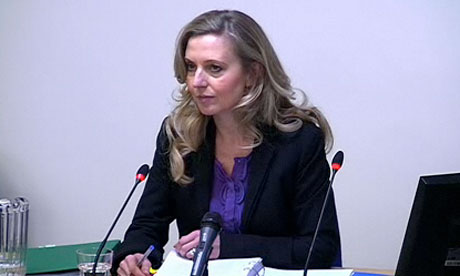
Leveson inquiry: Sunday Mirror editor Tina Weaver has been giving evidence
2.56pm: Lloyd Embley, editor of the People, has taken the stand.
2.55pm: Penman has finished giving evidence.
2.53pm: Leveson thanks Penman for his evidence, describing him as engaged in a "worthwhile occupation" protectings readers' consumer rights.
Penman completes his evidence with a final warning: "If the press are stifled, then the public are stifled."
2.52pm: Penman says he generally will give prior notification of stories and that, mainly, it will "prove very fruitful, on occasions".
Barr asks Penman whether prior-notification should be made compulsory. Penman says: "I fear it being made compulsory under any circumstances."
2.47pm: Penman is giving evidence on prior-notification. He says that an obligation to notify subjects of stories would be detrimental to investigative journalism and would help fraudsters and crooks.
2.43pm: Andrew Penman, investigative journalist at the Daily Mirror, has taken the stand.
2.42pm: Weaver has now finished giving evidence.
2.41pm: Weaver suggests that a log of public interest decision-making would give lawyers something to use against newspapers "but I can see the arguments for doing it".
2.39pm: Lisa O'Carroll has just tweeted:
#leveson weaver and Wallace far better ambassadors for tabloids than dominic mohan and Dawn neesom
2.437pm: Weaver is asked about another Christopher Jefferies story that is bylined Nick Owens and another reporter.
She says that Owens had no part in the story and is "upset" that his byline appeared on it."Newspapers work under enormous pressure … I don't know why it [the byline] was put on but it was a mistake and it shouldn't have happened," she says.
2.36pm: The Sunday Mirror "would never have published" the hoax stories offered by Chris Atkins, Weaver tells the inquiry.
She says that when reporters go to meet people they don't know whether they are hoaxers or liars.
2.31pm: The Sunday Mirror "tries to reflect a national interest" with its coverage of celebrities, Weaver says.
2.30pm: Weaver is asked about Chris Atkins' Starsuckers film. She spoke to Nick Owens, the Mirror reporter who suggested he would pay Atkins for private information about celebrities. Owens apologised for his remarks.
"I can't recall which specific comments – there were a number ... I spoke to Mr Owens at the time and he apologised and said he's said some unhelpful things," she says."He realised it wasn't in the public interest at some stage and didn't even report his meeting to the news desk … I would like to say that this story would never have been published."
She adds: "Apart from this incident, he's a very good and honest reporter."
2.26pm: Weaver is asked about the paper's coverage of Christopher Jefferies. She says she wasn't in the office at the time – it was over Christmas and New Year 2010/11 – and adds: "People recognise it was a poor misjudgment."
2.22pm: Weaver says she was not involved in the decision to use subterfuge on a recent story about bailiffs.
The decision would not be documented, she says, and it would be one taken by the news desk and lawyers."It is the difficulty of investigative journalism – you are hoping for a public interest at the end of an honest endeavour to expose wrongdoing," she adds.
2.19pm: Weaver is careful not to align herself with Paul McMullan, the outspoken former News of the World reporter, when discussing the public interest.
"It's being interpreted too narrowly at times … I think what readers deem to be in the public interest is deemed by judges to be private," she adds.Weaver does not like the phrase "kiss and tell" stories, describing it as a term used by "broadsheet commentators" for stories about relationships.
2.16pm: Sometimes the perception of public interest is too narrow, Weaver says.
She tells Leveson that she sat on the Rio Ferdinand story for two weeks while she "wrestled with competing tensions"."It's where the line is being drawn that concerns me," Weaver says, on the right to free expression and right to privacy.
She says privacy injunctions brought by "rich, powerful men … rained down on us" about a year ago.
2.12pm: Weaver says she has seen more of Labour prime ministers than David Cameron because of the Sunday Mirror's political leaning.
She adds that meetings with politicians do not have much impact and that readers have their own views.Weaver refers again to the "News International situation", meaning the controversy over that company's links with the Met police.
"Perhaps everybody did become too close … I don't believe that's the case at the Sunday Mirror," she tells Leveson.
2.07pm: Off-the-record guidance tends to be restricted to crime reporters, Weaver says, adding that it often "relies on trust and respect".
Weaver says there is "almost paralysis" in contact between press and police since the "News International situation".
2.05pm: Weaver says she had lunch with former Met police commissioner Ian Blair and a number of other people once, but has not met his successor.
Asked what the Sunday Mirror wants in its dealings with the police, Weaver says: "Stories, information."
2.05pm: The inquiry has resumed. Tina Weaver confirms that the Sunday Mirror last used private investigator Steve Whittamore in 2002.
2.01pm: A second witness statement by Tina Weaver has been published (below) dealing solely with claims from the filmmaker Chris Atkins' claims that the Sunday Mirror was willing to pay for private information about celebrities.

No comments:
Post a Comment